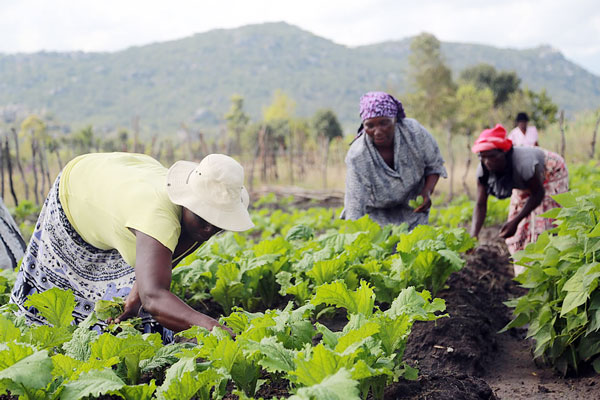
After the death of her husband, Sinodia Moyo* (58) was left with nothing in terms of moveable assets after her in-laws took everything away from her. She was left with a small piece of land after property such as livestock and household goods were distributed among her in-laws, leaving her in the cold.
social commentary with Moses Mugugunyeki

Moyo, of Maribha Village, Goredema in Gokwe North, is among many widows in Zimbabwe who face tremendous hardships following the death of their spouses.they are denied the right to access, own, control or inherit property including the land they live on.
“We were hardworking and acquired considerable property including livestock, together with my husband. We had a very big piece of land, which we fully utilised for the benefit of our family, but today everything has been taken away from me,” Moyo said.
Zimbabwe, just like any other African country, is fought with traditional practices, rituals and attitudes which perpetuate the discrimination and infringement of women’s fundamental civil liberties.
Although the Constitution outlaws violation of an individual’s rights to land or property on the basis of gender, most women in Zimbabwe are not able to inherit family estates and property, because of a dominant patriarchal value system.
In its endeavour to create an enabling environment for the attainment of equity and equality between women and men, Zimbabwe has ratified various international conventions and declarations on gender equality — the Convention on the Elimination of All Forms of Discrimination against Women (Cedaw of 1979, the Beijing Platform for Action (1995) and the Sadc Gender and Development Declaration (1997).
The Beijing Platform for Action affirmed that women’s right to inheritance and ownership of land and property should be recognised, while Cedaw provides a universal basis for promoting women’s rights as human rights, referring to women’s rights to equal treatment in land and agrarian reform processes.
- Chamisa under fire over US$120K donation
- Mavhunga puts DeMbare into Chibuku quarterfinals
- Pension funds bet on Cabora Bassa oilfields
- Councils defy govt fire tender directive
Keep Reading
At home, the country has put in place various national legislative instruments aimed at guaranteeing women’s legal and constitutional rights and these include the Zimbabwe Gender Commission Act (Chapter 10:31).
But despite efforts to bring about gender awareness at various levels in Zimbabwe, customary law has been allowed to prevail over legislative instruments, leaving women vulnerable to harmful traditional and cultural practices.
“The pervasive patriarchal biases should be discouraged, both in formal courts and informal family administration, to uphold women’s property rights,” said Pearl Matibe, founder of Advocates for Progress, a US-based independent think-tank.
“Government should institute an educational programme that mobilises families, in-laws and men, among others, at local, rural and urban levels so that women’s property rights are upheld.
“This type of awareness and mobilisation ought to strengthen Zimbabwe’s cultural identity since biases have historically leaned towards a ‘traditional’ approach and deepen the culture in which women are an integral part.”
Almost 70% of the world’s population doesn’t have access to land registration systems giving landowners clear title to their property, with women among the most disproportionately affected.
In many countries around the world, women’s property rights are limited by social norms, customs and legislation hampering their economic status and opportunities to overcome poverty.
“I even tried to engage traditional leaders in the area, but to no avail,” Moyo said.
Addressing journalists attending a land rights reporting workshop in South Africa recently, Mackay Rigava from the Africa Land Policy Centre said land rights was a complex web of state laws, customs, traditions and histories that vary from country to country.
However, he said efforts were being made to address these imbalances through the implementation of the African Union Declaration on Land Issues and Challenges (2009).
“The land policy initiative is committed to facilitate dialogue on women’s land rights issues with a view to raising awareness on the importance of addressing related challenges that hamper socio-economic development,” Rigava said.
“The policy facilitates resource mobilisation in support of efforts to address women’s land rights in land policy-related research, advocacy, capacity development, technical support and advisory services, among others.”
The United Nation’s new Sustainable Development Goals (SDGs), which guide development efforts, recognise the importance of property rights for women, especially in rural areas.
The SDGs have set targets so “all men and women have equal rights to ownership and control over land by 2030” and a linked target of doubling “the agricultural productivity and incomes of small-scale food producers, especially women”.
According to research by the World Bank and the UN’s Food and Agriculture Organisation, land gives women access to capital, bargaining power in family disputes, freedom to leave abusive marriages and, especially in rural areas, a clear path to making a contribution to the economy.
While acknowledging that Zimbabwean women have always received a wooden spoon when it comes to land rights, Zimbabwe Gender Commission chairperson Margaret Mukahanana-Sangarwe said efforts were being made to address gender imbalances.
“The gender commission is seeking an alignment of laws, including those related to land, with the constitution so that these can become responsive to the specific needs of women,” she said.
“It has also identified culture as one of the impediments to gender and social justice and is targeting gatekeepers for sensitisation on the need to recognise the constitutional guarantees of equality to all citizens. One strategy is to have more women in land-related decision-making as that would ensure their perspective is considered.”
Despite the rights to land for women being enshrined in law in Zimbabwe, Mukahanana-Sangarwe believes the practice of law in reality often has not delivered women’s empowerment and rights.
“It is true that access to land was not equal and agriculture-related support under the various programmes did not equally provide for women as it did to men,” she said.
“This is why Statutory Instrument 53 on co-registration of land was adopted as a redress. Command agriculture support, initially pegged at minimum land size of five hectares, inadvertently already makes more women than men ineligible.”
*Not her real name.









